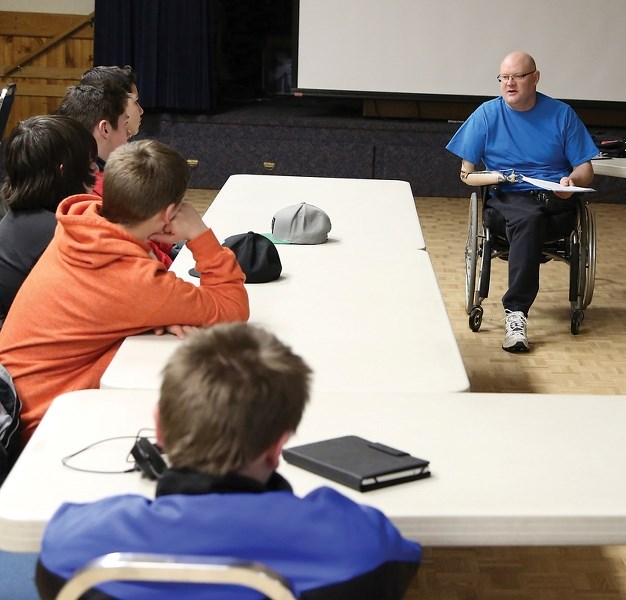As young people are wont to do rather foolish things at times, the PARTY Program is there to show them their actions have consequences.
On Feb. 11, nine Grade 9 students were escorted around Westlock by Victim Services Unit co-ordinator Maureen Gibson as part of the Prevent Alcohol and Risk-Related Trauma in Youth program, with stops at the fire hall and Legion.
During the day, the students learned about several events they may encounter as they are growing up and feeling out the world, and what can happen to them in the event they don’t proceed with their eyes wide open.
A large part of the program’s focus is on impairment caused by alcohol and other substances, and the potential results of that impairment.
Gibson said one of the topics the students learned about was traffic collisions, and the importance of wearing a seatbelt in the unfortunate circumstance they are involved in a collision.
RCMP collision reconstructionist Const. Bob Archer took part in that discussion, she said, showing the students photos from various collision scenes, explaining how those collisions happened and ways to avoid them.
Another stop was at the fire hall, where the students learned about the “golden hour” — how the chances of survival dramatically increase if medical attention is provided within the first hour after any major trauma. Gibson said they were also given insight into what it’s like to be involved in, or respond to, a traumatic incident.
“These kinds of incidents are hard to forget,” she said. “It’s easy to be affected by them, whether you know the people involved or not.”
Also discussed was sexual safety, particularly keeping yourself safe from sexual assault. Gibson explained the students dealt with the concept of consent when it comes to sexual encounters, sussing out what is considered a “yes” and what means “no.”
However, what may have been the most visual lesson the students received took place when they met with double amputee Dean Krawec, who lost his left leg and right arm in a workplace accident close to 20 years ago when he was 23.
Krawec explained he was injured while working on a pipeline worksite when the sideboom he was on began to roll away. In trying to stop it, his left leg got caught in the treads, and when he tried to free himself, he got his right arm caught as well.
He received medical attention in that “golden hour,” which he said was pivotal to his survival.
In hospital, doctors amputated all but 15 centimetres of his right arm, as well as performed a hemipelvectomy on his left side, which means half his left pelvis and his entire left leg were amputated.
Krawec acknowledged his incident was not the result of youthful recklessness or negligence. However, it did serve as a vivid illustration of what a person and their loved ones go through following any major, traumatic event that results in grievous injury.



